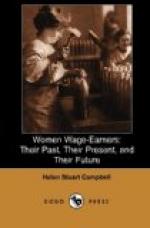“Woman is more evil than the storm-tossed waves, than the heat of fire, than the fall of the wild cataract! If it was a god who created woman, wherever he may be, let him know that he is the unhappy author of the greatest ills.”
This was a summary of the Greek view as a whole. Sparta trained her girls and boys alike in childhood; but the theories of Lycurgus, admirable at some points, were brutal and short-sighted at others, and Sparta demonstrated that the extinction of all desire for beauty or ease or culture brings with it as disastrous results as its extreme opposite.
It is Athens that sums up the highest product of Greek thought, and that represents a civilization which from the purely intellectual side has had no successor. Yet even here was almost absolute obtuseness and indifference, on the part of the aristocracy, to the intolerable bondage of the masses. “The people,” as spoken of by their historians and philosophers, mean simply a middle class, the humblest member of which owned at least one slave. The slaves themselves, the real “masses,” had no political or social existence more than the horses with which they were sent to the river to drink. In any scheme of political economy Aristotle’s words, in the first book of the “Politics,” were the keynote: “The science of the master reduces itself to knowing how to make use of the slave. He is the master, not because he is the owner of the man, but because he knows how to make use of his property.”
In fact, according to this chivalrous philosopher, the man was the head of the family in three distinct capacities; for he says: “Now a freeman governs his slave in the manner the male governs the female, and in another manner the father governs his child; and these have the different parts of the soul within them, but in a different manner. Thus a slave can have no deliberative faculty; a woman but a weak one, a child an imperfect one.”
That liberty could be their right appears to have been not even suspected. Yet out from these dumb masses of humanity, regarded less than brutes, toiling naked under summer sun or in winter cold, chained in mines, men and women alike, and when the whim came, massacred in troops, sounded at intervals a voice demanding the liberty denied. It was quickly stifled. The record is there for all to read; stifled again and again, from Drimakos the Chian slave to Spartacus at Rome, yet each protest from this unknown army of martyrs was one step onward toward the emancipation to come. In each revolution, however small, two parties confronted each other,—the people who wished to live by the labor of others, the people who wished to live by their own labor,—the former denying in word and deed the claim of the latter.




